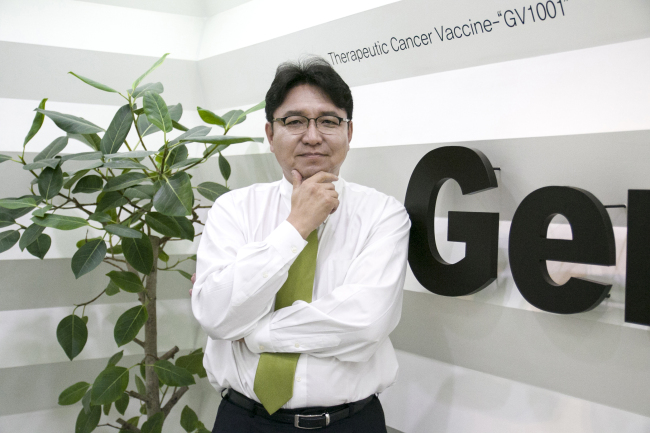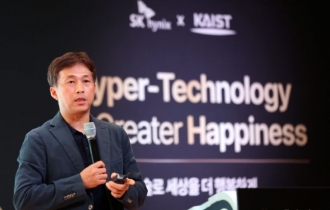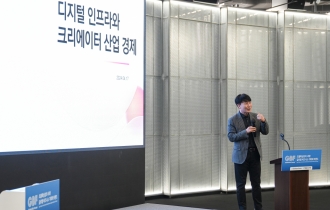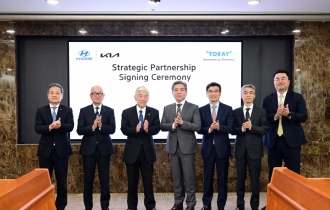GemVax & KAEL’s Alzheimer’s disease therapy on fast track
[THE INVESTOR] For a decade now, GemVax & KAEL has been pursuing a single goal -- to discover a blockbuster therapy. The homegrown biotech firm now believes it has found one: a treatment for Alzheimer’s disease. Or more specifically, for patients with mid- and late-stage Alzheimer’s, who really don’t have cures or even properly-working treatments.
“Interim clinical trials found that there’s much room for our lead drug candidate GV1001 to be applied to Alzheimer’s, and that it may possess superior efficacy in maintaining cognitive functions over Donepezil, which is the currently approved medication for the neurogenerative disorder,” GemVax & KAEL CEO Song Hyoung-gon told The Investor during an interview on March 15.

GemVax & KAEL CEO Song Hyoung-gon
GV1001 is a synthetic peptide derived from human telomerase that was originally developed to fight cancer. Since 2015, it has been developed as a pancreatic cancer therapy sold under the brand name RIAVAX.
But recent clinical trials showed that GV1001 inhibits the build-up of amyloid beta and tau proteins, which are thought to be the key drivers of Alzheimer’s.
“We hope to present the data in a medical journal in three months,” Song said.
GemVax & KAEL is also planning to seek US Food and Drug Administration approval for clinical trials this year, in addition to filing an Investigational New Drug application. In Korea, the firm hopes to finish recruiting patients for its phase 2 clinical program soon.
In the best-case scenario, Song believes GV1001 could receive conditional approval from Korea’s health regulators for commercialization after phase 2 trials next year.
Bringing an Alzheimer’s therapy to the market is a challenging task for global pharmaceutical companies. In January, Pfizer announced that it would abandon research to find new drugs for Alzheimer’s, while Eli Lilly and Merck have also been stumped in their efforts.
“Following Pfizer’s decision, many have cast doubts on the future success of GemVax & KAEL,” said Song. “But when Pfizer gave up, it actually meant it would wait until the next smart guy comes up and develops a drug so it can buy the license.”
Among five potential Alzheimer’s treatments currently under development by Korean companies, GemVax & KAEL’s is the only one that modifies the disease; the rest are herbal or stem cell-based therapies.
“What you need for the development of Alzheimer’s disease therapy is not just money. I believe it’s a flexibility that allows a company to change the plans swiftly to fit the circumstances when needed.”
He said the biotech firm is not in a hurry to strike an out-licensing agreement for the drug candidate.
“We will find a partner after the final analysis of phase 2 clinical study data comes out around June next year to enhance value,” he said.
Granting exclusive rights to commercialize the GV1001-based treatment in the US to GemVax & KAEL’s California’s-based subsidiary Teloid is a possible option. The license for Korea belongs to its subsidiary Samsung Pharm.
“We have some 20 telomerase-derived peptide drug candidates for further development down the road. GemVax & KAEL will keep focusing on drug development rather than selling and marketing them,” he said.
By Park Han-na (hnpark@heraldcorp.com)
EDITOR'S PICKS
- SK hynix chief underscores chip cooperation between Korea, US
- Trilateral talks acknowledge ‘serious’ slumps of won, yen
- Samsung C&T president makes her first business trip to Milan
- Seoul Business Agency CEO says SNS marketing essential for SME
- CJ Olive Young offers real-time translators for foreign visitors
- Hyundai Motor, Toray join hands for material innovation in mobility
- Paris Baguette debuts in the Philippines
- Samsung develops fastest DRAM chip optimzied for ondevice AI















